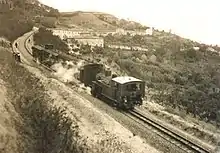List of rack railways
This is a list of rack railways, both operating and closed.
Angola
- Lengue gorge.[1]
- on Benguela railway – 1906.[2] 1,067 mm (3 ft 6 in) gauge.
Argentina
- Transandine Railway between Mendoza and Santa Rosa de Los Andes, Chile, see Chile below.
Australia
- West Coast Wilderness Railway in Tasmania, originally opened in 1896 to service the Mount Lyell copper mine and closed and completely removed in 1960s. Rebuilt and re-opened for tourists in 2003. Uses the Abt rack system. 1,067 mm (3 ft 6 in) gauge.
- Mt Morgan Rack Railway on Mount Morgan – rack system existed until 1952 when the line was deviated. Used the Abt rack system. 1,067 mm (3 ft 6 in) gauge.
- Ellalong Colliery – underground Lamella rack – installed in 1984
- Skitube Alpine Railway – Lamella rack – in the Snowy Mountains, opened in 1987; 1,435 mm (4 ft 8+1⁄2 in) gauge.
- Blue Mountains sewerage project – temporary 610 mm (2 ft) gauge construction railway, 1995
Austria
- Achensee Railway (Achenseebahn), Tyrol 1,000 mm (3 ft 3+3⁄8 in)
- Erzberg Railway (Erzbergbahn), Styria
- Gaisberg Railway (Gaisbergbahn), Gaisberg (1887–1928)
- Kahlenberg Railway (Kahlenbergbahn), Kahlenberg, Döbling, Vienna (1872–1920)
- Schafberg Railway (Schafbergbahn), Upper Austria 1,000 mm (3 ft 3+3⁄8 in)
- Schneeberg Railway (Schneebergbahn), Lower Austria
Bolivia
Brazil
- Corcovado Rack Railway
- The Estrada de Ferro Santos-Jundiaí which became part of Rede Ferroviária Federal Sociedade Anônima (RFFSA) 1957–1997, now owned by MRS Logística. 1,600 mm (5 ft 3 in) gauge between Paranapiacaba and Raiz de Serra.
- Teresopolis and Petropolis railways, both out of service, near Rio de Janeiro.
Chile
- Arica–La Paz railway, Arica–La Paz
- Santa Lucía Hill tramway (Abt system), Santiago (1902–1910)[3]
- The Transandine Railway, Santa Rosa de Los Andes – Mendoza, Argentina The rebuild will be adhesion only and use a base tunnel.[4]
China
- Dujiangyan–Siguniangshan mountain railway (under construction, to be opened in 2024~2025)[5]
Czech Republic
France
Germany

Stuttgart Rack Railway with wagon to transport bicycles
- Drachenfels Railway (Drachenfelsbahn)
- Harz Railway (Harzbahn, adhesion only today)
- Rübeland Railway (Rübelandbahn, adhesion only today)
- Höllentalbahn (adhesion only since 1933)
- Murg Valley Railway (adhesion only since 1926)
- Stuttgart Rack Railway, Stuttgart
- Wendelstein Railway (Wendelsteinbahn)
- Bavarian Zugspitze Railway (Bayerische Zugspitzbahn)
Greece
Hungary
- Fogaskerekű Vasút in Budapest, Hungary is a kind of cog-wheel tram in the hilly Buda part of the city.
India
- Nilgiri Mountain Railway, in the Indian state of Tamil Nadu is also a World Heritage Site. It runs using steam powered 'X' Class locomotives built by the Swiss Locomotive and Machine Works.
Indonesia

The State Railways of West Sumatra in 1898
- The former State Railways of West Sumatra's line between Kayu Tanam and Batu Tabal (reactivation pending), and Padang Panjang to Payakumbuh (disused).
- The former Netherlands East Indies Railways' line between Ambarawa and Gemawang, on the Kedungjati-Ambarawa-Magelang-Yogyakarta line. Only the Ambarawa-Bedono section is in operation as a tourist line.
Both railways used the Riggenbach system.
Italy

Rack railway Saline-Volterra, built with Strub system. Italy, about 1920
- Mont Cenis Pass Railway; temporary while main tunnel built.
- Vesuvius Funicular (1880–1944; originally built as a funicular and then changed to a rack railway. It was the only railway climbing an active volcano. It was destroyed various times by Vesuvius eruptions. With its last destruction in 1944, it was never built again. It is famous worldwide as a result of the song "Funiculì Funiculà" written about it)
- Opicina Tramway (1902–1928; rack replaced with a funicular section)
- Rittnerbahn (rack section closed)
- Superga Rack Railway
- Principe–Granarolo rack railway in the city of Genoa
- S.Ellero – Saltino (1892–1922; it was the first rack railway built in Italy)
- Lagonegro-Castrovillari-Spezzano Albanese of Ferrovie Calabro Lucane (1915–1978; it consisted of a series of separated lines which had to be unified into a single one but the project was never completed)
- Vibo Valentia-Mileto of Ferrovie Calabro Lucane (1917–1966; it was a local rack railway localized in south Italy)
- Rocchette-Asiago (1910–1958; it was the highest Italian rack railway)
- Catanzaro Città – Catanzaro Sala of Ferrovie della Calabria (Actually on service; it connects the city of Catanzaro to the borough of Sala)
- Paola-Cosenza of Ferrovie dello Stato (1915–1987; it was replaced by a tunnel)
- Saline-Volterra of Ferrovie dello Stato (1863–1958; it was part of a railway which connected Cecina to Volterra. Downstream flat line, from Cecina to Saline, is actually on service)
- Dittaino-Leonforte of Ferrovie dello Stato (1918–1959; it was located on the island of Sicily)
- Dittaino-Piazza Armerina of Ferrovie dello Stato (1912–1971; it was dismissed after a series of landslides which damaged some parts of the line)
- Lercara Bassa-Filaga-Palazzo Adriano-Magazzolo of Ferrovie dello Stato (1924–1959; it was used for mining and workers transports in Sicily )
- Agrigento-Naro-Licata (1911–1960; it was used to transport sulfur extracted from mines located on the island of Sicily)
Japan
- Ikawa Line, Oigawa Railway
- Usui Pass was the first rack and pinion line in Japan, on the Shin-Etsu Line of the then Japanese National Railway. It was replaced in 1963 by a new parallel adhesion line, and in turn replaced by the Nagano Shinkansen line opened for the 1998 Winter Olympics at Nagano.
Lebanon
Mexico
- The 762 mm (2 ft 6 in) gauge Mapimi Railroad in Durango State had a short Abt rack section from El Cambio to Ojuela. The maximum grade was 13.6% and it was worked by two Baldwin 0-6-2T steam locomotives built in 1896 and two Baldwin 2-6-2T steam locomotives built in 1898 and 1900. The railroad closed in the early 1930s.[6]
Panama
- Large ships are guided through the Panama Canal Locks by electric locomotives known as mulas (mules), running on rack rails on the lock walls. The new locks, projected to open in 2015, will use tugs.
Philippines
- The Manila Railway and Manila Railroad companies (now the Philippine National Railways) briefly operated oil burning cog locomotives starting in 1914 until 1917. One of these locomotives were named Mirador, named after one of the mountains along the proposed Aringay–Baguio line.[7]
Portugal
- Monte Railway – there was previously a cog railway from Funchal to Monte in Madeira Island, which operated between 1893 and 1943, and went further up to Terreiro da Luta at 867 m above sea level.
Romania
- Bouțari - Sarmizegetusa segment of Caransebeș - Subcetate railway, measuring 18.78 km, between 1909 and 1978.
Slovakia
- Štrbské Pleso – Štrba rack railway
- Brezno – Tisovec rack railway
- Zakarovce rack railway (Marienhütte ironworks)
South Africa
- There used to be a Riggenbach rack railway built by the NZASM between Waterval Boven and Waterval Onder. It was in operation until 1908.[8] 3 ft 6 in (1,067 mm) gauge.
Switzerland
- Appenzeller Bahnen
- Bergbahn Rheineck-Walzenhausen (RhW)
- Berner Oberland Bahn, also owning Schynige Platte Railway
- Chemin de fer Aigle-Leysin
- Chemin de fer Aigle-Ollon-Monthey-Champéry
- Chemin de fer Bex-Villars-Bretaye
- Chemin de fer Blonay – Les Pléiades
- Brienz Rothorn Bahn
- Chemin de Fer de Martigny au Châtelard (MC)
- Chemin de fer Montreux-Glion-Rochers-de-Naye
- Dampfbahn Furka-Bergstrecke (DFB)
- Dolderbahn (Db)
- Gornergratbahn (owned by BVZ Holding and managed by MGB)
- Joweid Zahnradbahn (a now closed freight line)
- Jungfraubahn – the highest rack railway in Europe
- Lausanne-Ouchy (1958-2006), see Métro Lausanne–Ouchy #History; now Lausanne Metro's M2 line
- Lausanne Flon-Gare
- Matterhorn-Gotthard Railway (MGB) (former Furka Oberalp Bahn and Brig-Visp-Zermatt Railway)
- Mühleggbahn (1950-1975, funicular before and afterwards)
- Monte Generoso Railway
- Pilatus Railway
- Rigi Bahnen (Arth-Rigi and Vitznau-Rigi railways)
- Rorschach-Heiden-Bahn, Rorschach to Heiden
- Wengernalpbahn – the longest continuous rack railway in the world
- Zentralbahn (Zb) (former Swiss Federal Railway's Brünigbahn and Luzern-Stans-Engelberg-Bahn)
United Kingdom
- Snowdon Mountain Railway
- Snaefell Mountain Railway
- Beamish Cog Railway
- Manx Electric Railway
United States

The Mount Washington Cog Railway in 2006
- The Chicago Tunnel Company (abandoned) used the Morgan rack system on the steep grade up to Grant Park.
- Manitou and Pike's Peak Railway, Manitou Springs, Colorado. Swiss-made Diesel-Pneumatic railcars, 1- or 2-car trains. Strub rack system, originally Abt.
- Mount Washington Cog Railway, Bretton Woods, New Hampshire. Bio Diesel & live steam cog train operations with Marsh rack system, world's first to be used as a mountain railway (inaugurated in 1868).
- Quincy and Torch Lake Cog Railway,[9] cog rail tram opened in 1997. Hancock, Michigan.
- Green Mountain Cog Railway (abandoned)
Venezuela
- The Puerto Cabello and Valencia Railway (abandoned) was constructed in the 1880s. It used rack and pinion (Abt system) on a steep section at Trincheras.[10]
Vietnam
- The Đà Lạt-Tháp Chàm Railway in Southern Vietnam. Abandoned after the Vietnam War, although a 7 km section remains in use as a tourist attraction. Built in the 1920s, the 84 km line had a cogwheel part 34 km long, running through four tunnels with a total length of almost 1,000 meters, taking trains from the Krongpha Pass up the Ngoan Muc (Bellevue) Pass to Da Lat.
References
- "trains-worldexpresses.com". trains-worldexpresses.com. Archived from the original on 2009-01-22.
- "Railpage". Railpage. Archived from the original on 2014-06-02.
- Morrison, Allen (1992). The Tramways of Chile: 1858–1978. New York: Bonde Press. pp. 64–65. ISBN 0-9622348-2-6.
- "Se construye". seconstruye.com. Archived from the original on 2007-03-10.
- "四川这条铁路是我国首个山地铁路,长约123公里,桥隧比达98.34%". Sohu (in Chinese). 31 March 2021. Retrieved 1 January 2023.
- "The Railroads of Peñoles". www.mexlist.com. Archived from the original on 2011-09-28.
- J.D.H. Smith. "Manila RR Steam Locomotives". Retrieved 2020-08-22.
- "Historical Sites in the Eland's Valley, Gateway to the Kruger National Park - stay over with us on your way to the Big Five in South Africa". Archived from the original on 2010-05-04. Retrieved 2010-05-27.
- "Large Photo 169A – Quincy & Torch Lake Cog Railway heads to Hancock". www.michiganrailroads.com. Archived from the original on 2008-02-27.
- Carruthers, John (1889). "The Trincheras Steep Incline on the Puerto Cabello and Valencia Railway, Venezuela". Minutes of the Proceedings of the Institution of Civil Engineers. 96. doi:10.1680/imotp.1889.20790.
This article is issued from Wikipedia. The text is licensed under Creative Commons - Attribution - Sharealike. Additional terms may apply for the media files.
